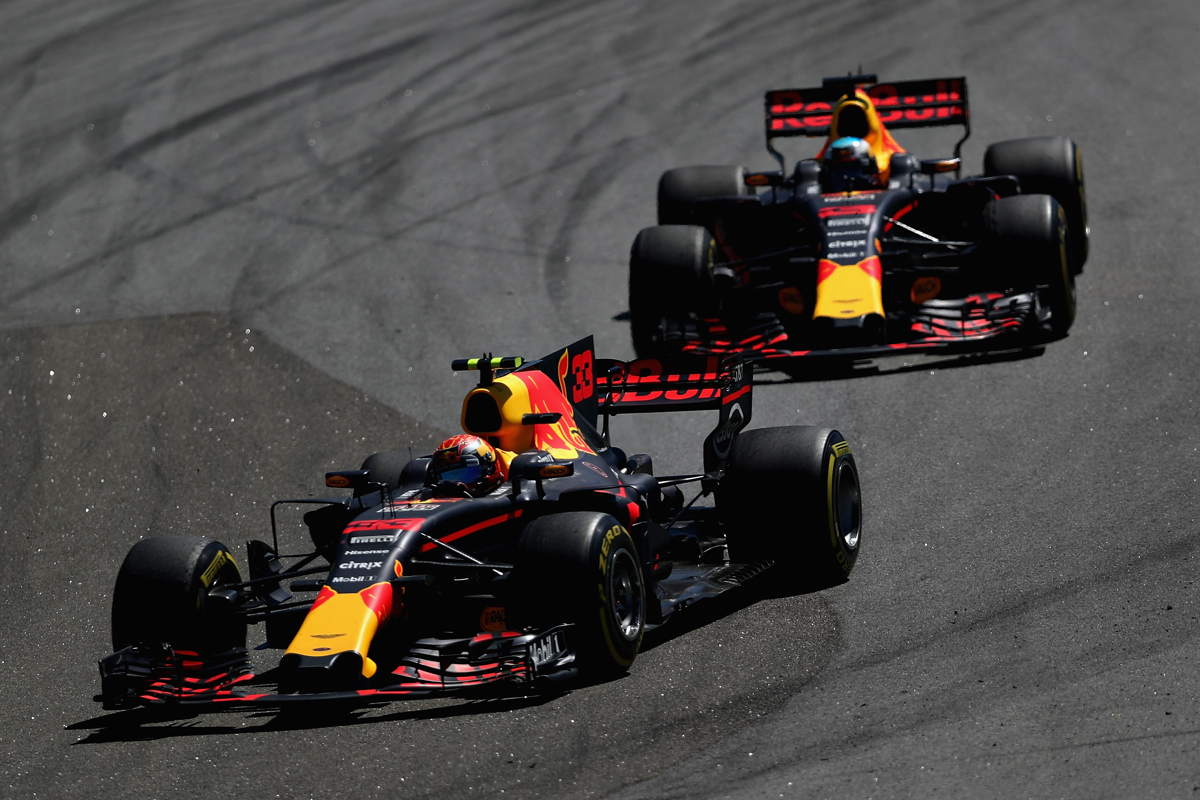AUSTRALIA’S Grand Prix star Daniel Ricciardo is becoming more and more frustrated as the 2017 season draws to a close. PETER COSTER reports:
DANIEL RICCIARDO’S toothy grin is has become more like a grimace after another race in which he started at the back end of the grid. No longer the smiling superstar of Red Bull Racing after being outqualified for the 13th time this season by teammate Max Verstappen, the Australian is also suffering from rules that regularly relegate the top F1 drivers to the back of the pack.
That is not where the millions of fans who watch Formula One on television and crowd the world’s circuits want to see them.
Having his turbo quit early in the Mexico Grand Prix two weeks ago, Ricciardo was forced to take a 10-place penalty for the Brazil Grand Prix on Sunday, which meant his fifth place on the grid saw him shuffled back to start 14th.

He described Mexico as “a crap weekend” and his mood had not improved when he was asked whether he had “bedded in” his new engine for the Brazil race. Sarcasm now seems to be Ricciardo’s response to questions about his problems.
The team had brought along “some new mattresses” and “you need to get a few people on the bed to figure it out” said the driver who always had the biggest grin in Formula One.
There was more about “a slumber party” at Red Bull and “pillow fights and all.”
It was only a couple of races ago that a frustrated Ricciardo feigned ignorance when he was asked was he “courting” other teams. Told courting meant something like “flirting”, Ricciardo replied “one doth flirt a lot”.
The recipient of this flirting is Mercedes, who would like to have Ricciardo alongside Lewis Hamilton, who had his own issues at Brazil when he had to start from the pit lane after crashing out in qualifying.
Hamilton is now world champion because of Sebastian Vettel’s driving errors, most notably at Mexico where the Ferrari driver could manage only fourth after colliding with Hamilton soon after the start.
In Brazil, Vettel outmanoeuvred Hamilton’s teammate, Valtteri Bottas, to take the lead and apart from some switch around as cars pitted for tyres, was a comfortable winner. Hamilton cut through the field to finish fourth, which explains some of the frustrations felt by Verstappen earlier in the season and Ricciardo at Brazil.
Ricciardo scythed through the field to finish sixth behind Verstappen with some brave passes and is the last of the late brakers.
Unfortunately, he did not have the pace of Hamilton in his rebuilt car. Hamilton’s Mercedes engine had to last only two races before the circus heads to Melbourne in March.
The 1.6-litre turbo hybrid was able to run in flat-out mode, without the team having to worry about overstressing its complex parts. Ricciardo’s engine was not only down on horsepower and torque compared with the Mercedes, but had largely run its race.
Verstappen, who was suffering from the same run of outs with tired engines earlier in the season, is now a happy camper with an extended contract.
Ricciardo has kept his options open after next year when his contract runs out and that has led to the speculation about his possible shift to Mercedes, where Valtteri Bottas has only a year to run on his contract.
The Finnish driver took pole at Brazil but failed to take the top step on the podium after being outdriven by Vettel at the start. The unassuming Mercedes driver admitted he should have held front position and won the race.
Mercedes chief Toto Wolff is happy enough with the Finn but unhappy with the way the elite formula is being run by the FIA and Liberty Media, whose Formula One boss Chase Carey looks as if he should be flying a Spitfire rather than piloting The F1 show.
At least Wolff and the much-mustachioed Carey agree that F1, as well as being the test bed for technology, is also an “entertainment platform”.
Carey, as vice-chairman of 20th Century Fox, knows about entertainment, but does he have the street smarts and cunning of ex-F1 supremo Bernie Ecclestone, who pocketed the billions Liberty Media paid for the greatest show on earth?
It’s the most expensive ticket in town if you want to get a place on the starting grid.
Toto Wolff says some of the suggestions put forward for engine changes from 2020 are “ridiculous”.
Having spent a billion dollars developing the car that usually takes pole position, Wolff is aghast that the FIA and Liberty may consider changes that will cost further billions. Yes, billions.
The major teams won’t agree to start over and the mid-field runners and the tailenders can’t afford it. New engine manufacturers, such as Porsche and Aston Martin, develop new power units.
McLaren’s Fernando Alonso described the lack of power from his Honda engine at Brazil as “amazing” when a better description might have been “appalling”, although his eighth place was better than he might have expected.
Toro Rosso has had to swap its Renault engines for McLaren’s struggling Honda engines, although it will gain the services of Renault driver Carlos Sainz.
Toro Rosso chief Franz Tost has become involved in a furious war of words with Renault chief Cyril Abiteboul, who said the team’s engine problems were because of “the way our engine is operated in the Toro Rosso car”.
Not for the first time, the Toro Rosso drivers were relegated to the back of the grid at Brazil because of engine failures and subsequent changes. Threats that Renault would not supply its engines for Abu Dhabi were denied by former French world champion Alain Prost, who is a consultant to Renault.
Prost raised his impressive nose and said the fine French firm would never play such “dirty games”.
The Toro Rosso boss suggested the unreliability of the engines Renault supplied to the team was because they were fighting Toro Rosso for a better position in the F1 constructors’ championship.
Such allegations are not unusual in Formula One as a frustrating season for everyone except the winners draws to a close.
At least, the FIA has acknowledged something needs to be done about the “buzz-Box” noises emanating from the current crop of F1 engines.
Go-karts have got more snap, crackle and pop.
F1 engines are surrounded by complex systems designed to boost their power output. MGU-K and MGU-K are F1 jargon for Motor Generator Unit-Kinetic and Motor Generator Unit-Heat, which are joined to the turbo to recover energy from heat caused by braking and gases in exhaust gases.
Only the dedicated petrol-head is aware of all these high-tech hang-ons and add-ons as teams and engine suppliers look for new ways to boost power and torque. F1 has become overdeveloped.
That’s why one of the changes the FIA and its new owners should look at is simplifying the need for speed.
When this correspondent asked Nigel Mansell who was likely to lead in the race to the first corner at the 1992 Adelaide GP, Mansell or Senna, he replied that it was a race between computers. It had nothing to do with the drivers.
The cars had active suspension, anti-lock brakes, traction control and launch control, which were banned at the end of the following year.
As it turned out, the drivers decided what happened as Senna and Mansell were forced to retire after Senna collided with Mansell as he attempted to overtake.
PETER COSTER is a former editor and foreign correspondent who has covered a range of international sports, including world championship fights and the Olympic Games.




Discussion about this post